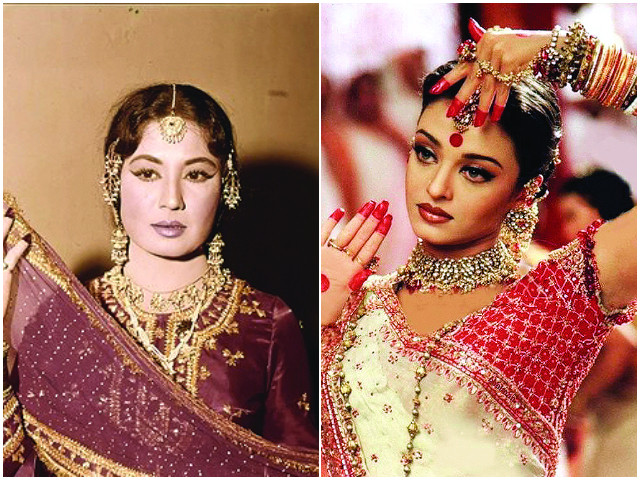
KARACHI:
In a dusty archive of Bollywood’s golden age, there’s a familiar gleam in every frame: the unmistakable sharp flick of a perfect wing, the deep intensity of kohled eyes. While hemlines rose and fell, studios shifted from songs to realism and back again, and technicolour replaced black-and-white, one element remained constant: the power of a perfectly lined eye.
From Meena Kumari’s tragic-romantic kajal to Rekha’s fierce wings that could probably take flight, Indian cinema has given us some of the most iconic eye moments in beauty history. But how has a simple streak of black maintained its chokehold on Bollywood’s beauty universe? The answer lies in a legacy that’s equal parts art, alchemy, and pure screen magic.
Kajal to disco wing
Long before liquid liners made their way into makeup bags, kajal was the undisputed queen of eye definition in Indian cinema. The 1950s and ’60s saw the rise of the “Meena Kumari eye.” The tragedy queen’s iconic style featured thick kajal at the outer corners, deliberately smudged to create depth, paired with a lighter application at the inner corners – a technique that made her eyes appear larger and more expressive. The lower lash line, heavily lined but softened, created that characteristic vulnerable look that became her signature.
But this wasn’t just about aesthetics – kajal’s history in India stretches back thousands of years, from ancient Ayurvedic formulations to its significance as a protective talisman.
When Waheeda Rehman graced the screen in Guide (1965), she brought with her a softer interpretation of the kajal-rimmed eye. Her look – delicate yet defined – represented the perfect marriage of tradition and modernity.
The 1970s ushered in the era of geometric precision, and no one embodied this revolution quite like Zeenat Aman. In Hare Rama Hare Krishna (1971), her razor-sharp wings became the talk of the town, inspiring a generation of women to ditch their kajal pencils for liquid liners. But it was Parveen Babi who truly pushed the envelope, pairing her signature wings with metallic shadows that screamed disco glamour in films like Amar Akbar Anthony (1977).
Rekha, the undisputed empress of the statement eye, redefined cinematic makeup in Umrao Jaan (1981). Her upturned wings paired with kajal-rimmed lower lashes formed an architectural template still referenced by makeup artists today. The wings followed the natural lift of her brow arch, smoothly connecting to the thick kajal on her lower lash line to create a striking, continuous frameher signature look.
Evolution of the wing
The ’90s saw Madhuri Dixit bring a more wearable version of the wing to screens. Her look in Hum Aapke Hain Koun..! (1994) – soft, fluttery, but still defined – showed that eyeliner could be both dramatic and daylight-friendly. Meanwhile, Kajol broke all the rules with her unibrow and kajal-heavy eyes in Dilwale Dulhania Le Jayenge (1995), proving that beauty standards were meant to be challenged.
As we entered the new millennium, Aishwarya Rai Bachchan’s perfectly symmetrical wings in Devdas (2002) set a new standard for precision. Her look combined the intensity of traditional kajal with the clean lines of modern liquid liner. Cut to 2018, Deepika Padukone’s dramatic wings in Padmaavat paid homage to the royal Rajput aesthetic while adding a contemporary edge. Perhaps the most refreshing development is the industry’s growing embrace of imperfection. When Vidya Balan rocked smudged kajal in The Dirty Picture (2011), she reminded us that sometimes the most powerful statements come from letting your liner live a little.
The endurance of these looks transcends mere tradition. One may argue that Indian eye shapes naturally lend themselves to elongated wings that lift the eye, while definition on the lower lash line adds depth that cameras love. The contrast of dark liner against South Asian skin tones creates drama without overwhelming the face. Perhaps most importantly, traditional kajal formulations, with their unique ability to withstand high humidity, proved perfect for long days under hot studio lights.
Channel your inner screen queen
Want to master the art of the Bollywood eye? Start with the foundations of the craft. The secret to that soul-stirring gaze lies in patience and layering – begin with a soft kajal pencil, working it into the waterline before gently smudging the outer corners. The key is building intensity gradually, rather than going in with a heavy hand from the start to get the Meena Kumari look.
For those coveting Umrao Jaan’s architectural finesse, remember that the perfect wing begins with understanding your own eye shape. The upward angle should follow your natural brow arch, but here’s the insider secret: the lower lash line is just as crucial as the wing itself.
Seeking something more contemporary? Take a cue from the lovestruck Paro in Devdas. Start with kajal in the waterline for depth, then layer a liquid liner on top for definition. The trick is to keep the line thinnest at the inner corners, gradually building width as you move outward.
Drama comes from balance and few can attest to this better than Deepika’s makeover as Padmavati. The extended wing may be the star, but it’s the perfectly defined lower lash line that anchors the entire look. Traditional kajal here works better than modern pencils – its creamy texture creates that authentic depth that cameras (and eyes) love.
Only if you’re feeling brave enough, dare to channel Zeenat Aman’s hippie geometry. Unlike Western cat-eyes that follow the lower lash line upward, the classic Bollywood wing of the ’70s takes a more ambitious trajectory, aiming toward the end of the brow.
Remember: these iconic looks weren’t created in a vacuum. They evolved from centuries of tradition, adapted for the silver screen. Whether you’re going for tragic-romantic or geometric precision, the real secret is understanding that these techniques were designed to enhance, not mask. After all, every great Bollywood eye tells a story – what will yours be?
